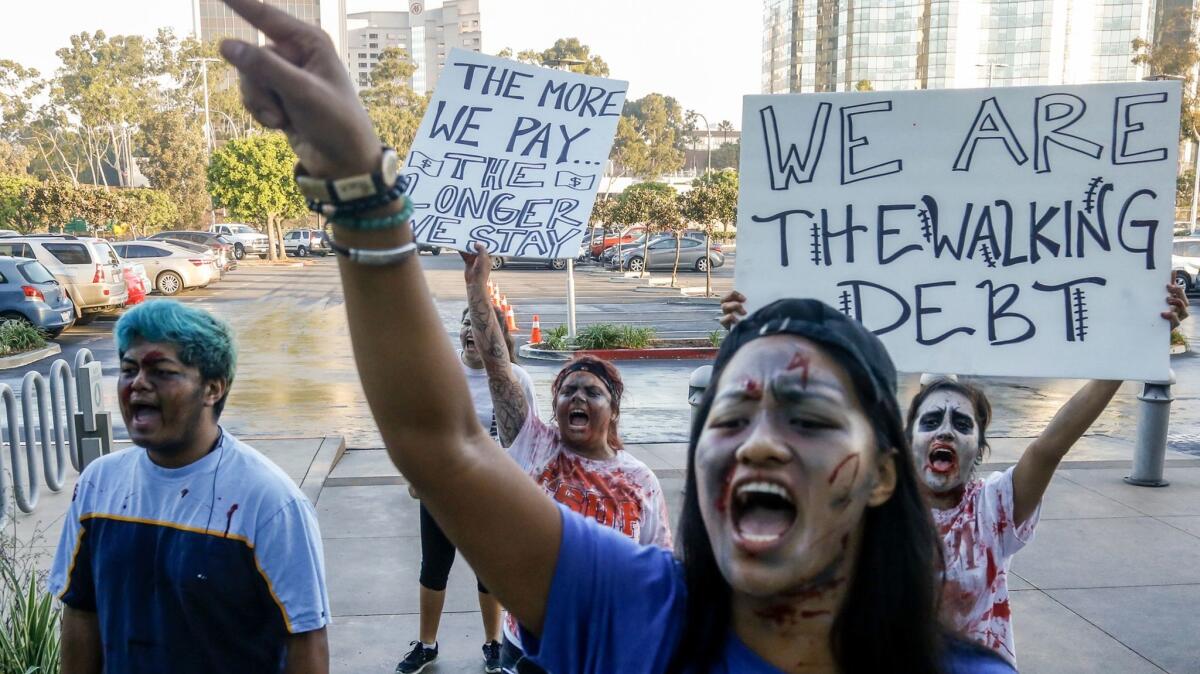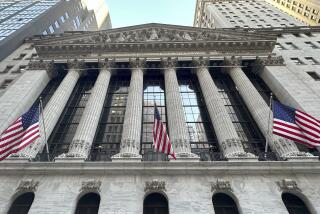Inflation is a state of mind. What you need to know about financial markets today

- Share via
It took all of a day for investors to get comfortable with the idea that the economy is heating up and that higher interest rates are on the way.
Stocks had another strong start Thursday before falling back somewhat. That is despite the 10-year Treasury yield hovering around 2.9% — perilously close to the 3%-to-3.5% range that some Wall Street observers consider “the next big pain threshold” where bonds and other fixed-income investments become more attractive than equities, Bloomberg noted.
‘What could possibly go wrong?’
There’s more evidence of price increases at the manufacturer and wholesale level, which will eventually work their way down to consumers. Mortgage rates have risen to 4.38%, the highest since April 2014. And bond traders are betting on even more Federal Reserve interest-rate hikes through 2019.
Higher interest rates are the risk of all the stimulus that’s being pumped into the already strong economy from a $1.5-trillion tax cut and $300-billion federal budget agreement. Even Goldman Sachs Chief Executive Lloyd Blankfein, talking to suddenly more optimistic small-business people, noted the parallels to another recent period of frothy excitement — a period that didn’t end so well. “What could possibly go wrong? I haven’t felt this good since 2006,” he joked.
Whose 0.5% inflation? Not ours
In his daily newsletter, Brendan Greeley notes that a lot of people — including those who work at the CPI-generating Bureau of Labor Statistics, and the interest-rate determining Fed — get paid to measure price inflation. But how they think about it is very different than how the rest of us actually experience inflation.
Stories about January’s CPI, for instance, noted a big price increase for apparel — the largest jump in one month in nearly 30 years. That shift helped move financial markets. “But look at total change since 2001 and you can barely see it,” Greeley notes.
Meanwhile, over that same period, the prices of healthcare and college have risen astronomically — to the point where these two arguably essential services are unaffordable for millions of Americans.
Greeley argues that the way people really think about prices is not how much they’ve gone up over the last week or month, but rather how cheap the important stuff used to be and how they can’t afford it now. Markets (and Congress) have failed to bring those costs down, and there’s little the Fed can do about it.
“So in finance today, a blip in stocks and possibly some shifts in bonds, all tied to guessing the Fed’s true heart,” Greeley wrote Wednesday. “For the rest of us, no news, really, just two massive market failures that continue to push out of reach two things we hold dear: our own health and the success of our children.” (Sign up here for the All We Know So Far newsletter. It’s free.)
Rolling them bones at Harvard
Cryptocurrency-grabbing millennials haven’t been the only ones searching for higher yields. In recent years, with Wall Street’s urging, college endowments and public-employee pension funds sank some of their money into real estate, commodities and hedge funds. And they bought complicated options contracts that bet on a continued run of calmly markets.
Boom.
With the return of extreme volatility the past two weeks, as represented by the gyrating Cboe Volatility Index or VIX, those university endowments took a hit. How much is unclear. Harvard’s endowment, Harvard Management Co., owned more than 100,000 shares of one exchange-traded volatility fund as of fall 2017, the Wall Street Journal reports. (Its fourth-quarter public filing indicates it sold the position.) The $9.3-billion San Bernardino County Employees’ Retirement Assn. has been trading a small portion of its assets in such funds for six years, its chief investment officer told the Journal.
The volatility funds have rebounded this week, along with stocks. So it’s unclear if the big endowments and pension funds have much incentive to change their strategy.
More to Read
Inside the business of entertainment
The Wide Shot brings you news, analysis and insights on everything from streaming wars to production — and what it all means for the future.
You may occasionally receive promotional content from the Los Angeles Times.











